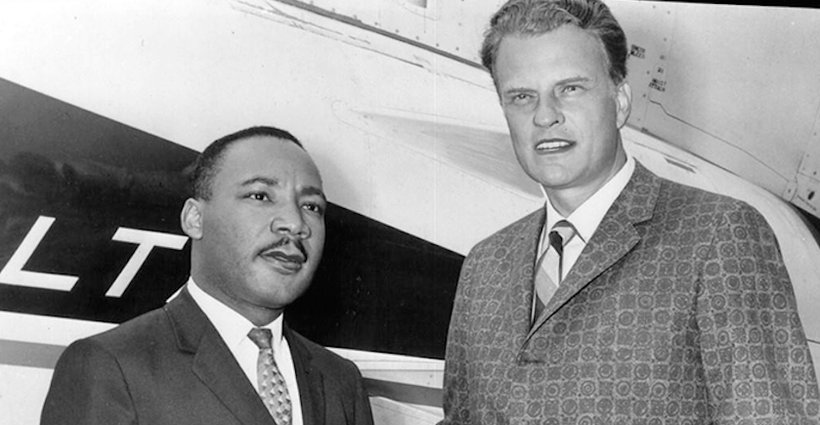
Mere months after the 16th Street Baptist Church bombing in Birmingham, Alabama, killed four black school children and sparked worldwide outrage, 30,000 Alabamians of all races gathered together for a rally in Legion Field Stadium.
A slender, 6’2″ white man in his mid-40s came to the podium and, according to author John Pollock, “preached a straight address of love, repentance and faith.”
The national media could not believe what happened next.
Hundreds of men and women of all ages and races peacefully streamed to the front at the end of the sermon, peacefully united in their desire to seek reconciliation with God, and with each other.
“National press reporters were stunned at the response,” recalled Pollock, “when blacks and whites together streamed forward at the invitation.”
The man at the podium was 45-year-old Billy Graham, who in spite of the threats of violence, felt compelled to join with Martin Luther King, Jr., and other civil rights activists in calling for America to embrace the full meaning of her Declaration’s famous words that “all men are created equal.”
“The Ku Klux Klan went around and knocked out our signs,” Graham now recalls. “The State Police had to send policemen with us wherever we went—before my car and after my car. The police were also in the rooms around me because they were afraid we would get shot.”
The event at Legion Field was the first of several that Graham would stage in Alabama in the following years.
Janet Chismar of the Billy Graham Evangelistic Association explains:
(I)n the early months of 1965, African Americans were beaten and attacked by police dogs during a march from Selma to Montgomery. President Lyndon B. Johnson responded by calling Billy to ask if he would hold a series of meetings in Alabama. He agreed, preaching in Dothan, Tuscaloosa, Auburn and Tuskegee.
Later that summer, Billy canceled a vacation in Europe to hold a 10-day Crusade in Montgomery. Nearly 100,000 people attended those meetings, and more than 4,000 accepted Christ.
Two quotes from Billy sum up his view on race during this period. In a 1960 Reader’s Digest article, titled “Brotherhood,” Billy said, “Though the race question has important social implications, it is fundamentally a moral and spiritual issue. Only moral and spiritual approaches can provide a solution.”
And during a 1963 radio broadcast, he said, “Only the supernatural love of God through changed men can solve this burning question. Christ was not so much a reformer as He was a transformer. This does mean the race problem is not to be preached and taught, but it is not to be our Gospel. … The racial problem in America will not be settled in the streets, but it could be settled in the hearts of men in a spiritual dimension.”
Dr. King later said that Graham’s courage and willingness to engage on the issue of Civil Rights in Alabama made a significant difference in their movement.
“Had it not been for the ministry of my good friend Dr. Billy Graham,” he said, “my work in the Civil Rights Movement would not have been as successful as it has been.”
Don’t miss out! Subscribe today to have Alabama’s leading headlines delivered to your inbox.